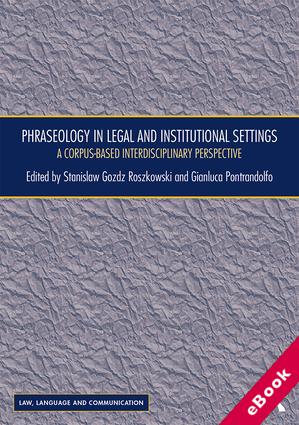We are now closed for the Christmas and New Year period, returning on Monday 5th January 2026. Orders placed during this time will be processed upon our return on 5th January.

The device(s) you use to access the eBook content must be authorized with an Adobe ID before you download the product otherwise it will fail to register correctly.
For further information see https://www.wildy.com/ebook-formats
Once the order is confirmed an automated e-mail will be sent to you to allow you to download the eBook.
All eBooks are supplied firm sale and cannot be returned. If you believe there is a fault with your eBook then contact us on ebooks@wildy.com and we will help in resolving the issue. This does not affect your statutory rights.
This volume presents a comprehensive and up-to-date overview of major developments in the study of how phraseology is used in a wide range of different legal and institutional contexts. This recent interest has been mainly sparked by the development of corpus linguistics research, which has both demonstrated the centrality of phraseological patterns in language and provided researchers with new and powerful analytical tools. However, there have been relatively few empirical studies of word combinations in the domain of law and in the many different contexts where legal discourse is used. This book seeks to address this gap by presenting some of the latest developments in the study of this linguistic phenomenon from corpus-based and interdisciplinary perspectives. The volume draws on current research in legal phraseology from a variety of perspectives: translation, comparative/contrastive studies, terminology, lexicography, discourse analysis and forensic linguistics. It contains contributions from leading experts in the field, focusing on a wide range of issues amply illustrated through in-depth corpus-informed analyses and case studies. Most contributions to this book are multilingual, featuring different legal systems and legal languages.
The volume will be a valuable resource for linguists interested in phraseology as well as lawyers and legal scholars, translators, lexicographers, terminologists and students who wish to pursue research in the area.